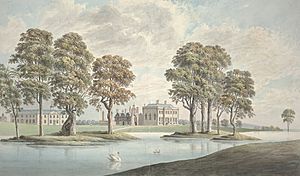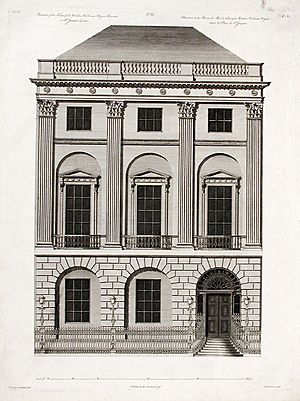Sir Watkin Williams-Wynn, 4th Baronet facts for kids
Quick facts for kids
Sir Watkin Williams-Wynn, Bt
|
|
|---|---|
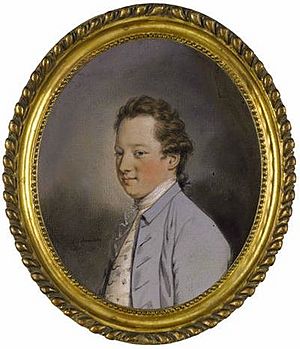
Portrait of Sir Watkin, by Hugh Douglas Hamilton
|
|
| Member of Parliament for Denbighshire | |
| In office 1774–1789 |
|
| Preceded by | Sir Lynch Cotton, Bt. |
| Succeeded by | Robert Watkin Wynne |
| Member of Parliament for Shropshire | |
| In office 1772–1774 Serving with Charles Baldwyn
|
|
| Preceded by | Richard Lyster Charles Baldwyn |
| Succeeded by | Noel Hill Charles Baldwyn |
| Personal details | |
| Born | 23 September 1749 |
| Died | 24 July 1789 (aged 39) |
| Spouses |
Lady Henrietta Somerset
(m. 1769; died 1769) |
| Children | 7, including Watkin, Charles, and Henry |
| Parents | Sir Watkin Williams-Wynn, 3rd Baronet Frances Shackerley |
Sir Watkin Williams-Wynn, 4th Baronet (born September 23, 1749 – died July 24, 1789) was an important person from Wales. He owned a lot of land, was a Member of Parliament (a politician who helps make laws), and supported artists.
His family, the Williams-Wynns, became famous in 1688. Later, they inherited more land and changed their name to show this.
Early Life and Wealth
Sir Watkin was the oldest son from his father's second marriage. His father died in a hunting accident when Watkin was just a baby. Because of this, he inherited the huge Wynnstay estates. These were very large areas of land, mostly in North Wales, but also reaching into England.
These estates brought in a lot of money, about £20,000 a year. This was a huge amount back then! Sir Watkin was very good at managing and spending this money.
When he turned 21 in 1770, he threw a massive party for 15,000 guests. Records show they ate 31 cows, 50 pigs, 50 calves, 80 sheep, and 18,000 eggs! A special embroidered suit he might have worn is now in the National Museum of Wales.
Political Career
Sir Watkin's family had been powerful in politics for many years. He controlled several seats in Parliament. He also led a group of politicians called the Tory faction in the House of Commons. However, he was not as involved in politics as his father had been.
He served as a Member of Parliament for Shropshire from 1772 to 1774. Then, he represented Denbighshire from 1774 until he died in 1789. He was only 39 when he passed away. Some people criticized him for not attending Parliament meetings very often. He was also the Lord Lieutenant of Merionethshire from 1775 to 1789.
Supporting the Arts
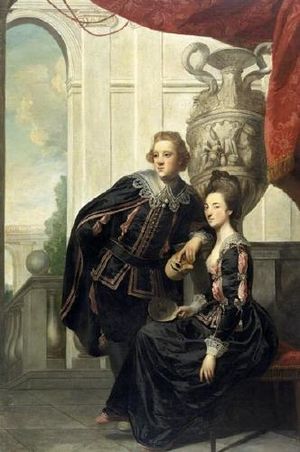
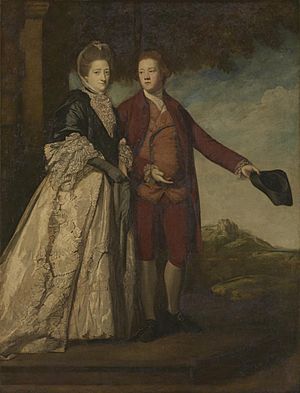
Sir Watkin loved art and music. He went on a "Grand Tour" of Europe in 1768. This was a common trip for wealthy young men to learn about art and culture. While in Rome, a famous artist named Pompeo Batoni painted his portrait.
He played a big part in helping Welsh art grow, especially landscape painting. He invited artists like Richard Wilson and Paul Sandby to his home, Wynnstay. Sandby stayed for six weeks in 1770, teaching the family and painting. The next year, Sir Watkin and Sandby toured the mountains of North Wales together. Sandby later used his sketches from this trip to create famous prints of Welsh views.
Sir Watkin also supported the "Concerts of Antient Music." He was even shown in a funny drawing (a caricature) by James Gilray, attending a concert he organized.
His Homes
Sir Watkin hired a famous architect, Robert Adam, to build two houses in St James's Square in London. These were built between 1771 and 1775.
He also asked the famous painter Sir Joshua Reynolds to paint several portraits for him. These included a portrait of him with his first wife, and another of his second wife with their children. Some of these paintings are still owned by the family today.
Family Life
Sir Watkin was married twice. His first marriage was in April 1769 to Lady Henrietta Somerset. She sadly died very soon after, in July 1769. Because Sir Watkin was under 21, he needed special permission from Parliament to get married.
In December 1771, he married Lady Charlotte Grenville. She was the daughter of a former Prime Minister. They had four sons and three daughters together. Some of their children included:
- Sir Watkin Williams-Wynn, 5th Baronet (1772–1840)
- Frances Williams-Wynn (1773-1857), who wrote diaries about politics.
- Charles Williams-Wynn (1775–1850)
- Sir Henry Williams-Wynn (1783–1856)
Sir Watkin died on July 24, 1789, at the age of 39.
 | Misty Copeland |
 | Raven Wilkinson |
 | Debra Austin |
 | Aesha Ash |


